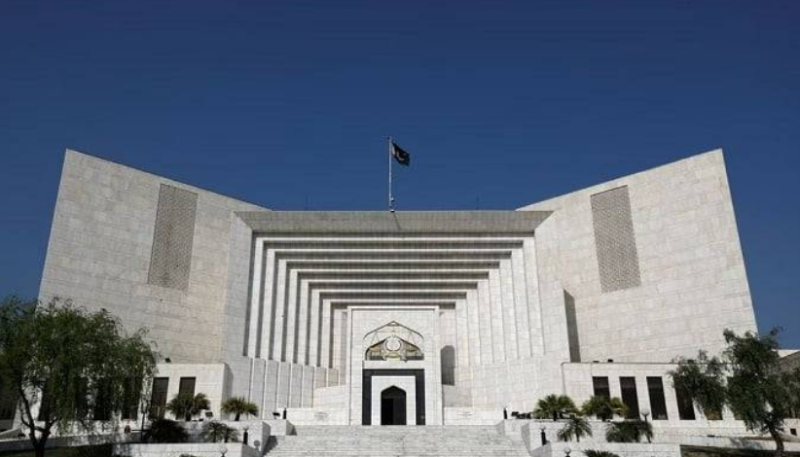Islamabad (Web Desk): The Supreme Court (SC) criticised the delay in implementing its decision on the reserved seats case, warning of serious consequences if the ruling is not implemented.
The ECP, in its clarification plea, had also stated that the PTI lacked an organisational structure as per theelectoral body’s record, which "is statutory obligation of every enlisted political party to conduct intra-party elections in terms of Section 208 of the Election Act 2017".
As per the written order of the top court, “Considering all evidence placed before the court left “little doubt that the clarification sought by the commission … is nothing more than a contrived device and the adoption of dilatory tactics, adopted to delay, defeat and obstruct implementation of the decision of the court. This cannot be countenanced. Even on the application of elementary principles of law, the application filed by the commission is misconceived”.
The SC order further said that the PTI had attached many notices to it by the ECP which identified Barrister Gohar Ali Khan as the party chairman and there were PTI documents as well identifying him as the chairman.
It added “Having itself recognised Barrister Gohar Ali Khan as the chairman of PTI, the commission cannot now turn around and purport to seek guidance from the court with regard to how the certifications are to be dealt with. The commission cannot approbate and reprobate, taking whatever [shifting] stance as it desires and as may seem to suit its immediate purposes for the moment, the court said.
“Furthermore, the commission, even if one were to consider the application in the most sympathetic light, has apparently forgotten the well-known de facto doctrine or rule, in terms of which the acts of a person who holds an office are protected even if there may be [and no such conclusion is reached here in relation to the PTI] any issue with the position de jure. It sufficed and the commission was duty-bound in terms of the Constitution to keep in mind that the admitted position [as stated before the court during the hearing of the appeals] is that the PTI was, and is, an enlisted political party.”
The order said that dissenting judges had also recognised Barrister Gohar’s validity as chairman, adding that this sufficed for the purposes of acting on the court’s reserved seats verdict.
“It would be completely illogical to assume that a political party, a juristic person, is fully functional yet there are no natural persons who are either de facto or de jure performing its functions or running its affairs. Saying … that a political party is an enlisted political party, fully functional for the purposes of its formation, yet there is no one that can perform its functions and run its affairs, amounts to blowing hot and cold in the same breath or, as noted, approbating and reprobating one and the same fact.
“There could have been no conceivable doubt that the certifications referred to above were correct and valid in terms of the short order and the continued denial and refusal of the commission to accept the same, as and when filed, is constitutionally and legally incorrect and may expose the commission to such further or other action as may be warranted in terms of the Constitution and the law,” the top court's order warned.
On the issue of the reserved candidates themselves, the order noted that the court had “categorically declared” in its verdict that on filing the requisite statement and its confirmation by the political party concerned, the seat secured by such a candidate would immediately be deemed to be a seat secured by that political party.
“Therefore, upon submission of the declarations and certifications referred to above, the position of the returned candidates (now respectively MNAs and MPAs) immediately and ipso facto stood determined and fixed as a matter of law as on those dates and no subsequent act can alter what became, on the respective dates, past and closed transactions.
“As per the position so determined, the said returned candidates were and are the returned candidates of PTI and thus members of the parliamentary party of PTI in the National Assembly and provincial assemblies concerned, for all constitutional and legal purposes.
“The attempt by the commission to confuse and cloud what is otherwise absolutely clear as a matter of the Constitution and the law must therefore be strongly deprecated. The list required to be issued by the commission … is nothing more than a ministerial act, for the information and convenience of all concerned, and has no substantive effect. Nonetheless, the continued failure of, and refusal by, the commission to perform this legally binding obligation may, as noted, have consequences. This obligation must be discharged forthwith,” the order stated.
On July 12, a 13-member full bench of the apex court ruled that the Imran Khan-founded party was eligible for the allocation of reserved seats for women and non-Muslims in the national and provincial assemblies.
Justice Mansoor Ali Shah announced the 8-5 majority verdict, nullifying the Peshawar High Court's (PHC) order wherein it had upheld the ECP’s decision denying the reserved seats to the Sunni Ittehad Council (SIC).
The other seven judges who supported the verdict include Justice Munib Akhtar, Justice Muhammad Ali Mazhar, Justice Ayesha A Malik, Justice Athar Minallah, Justice Syed Hasan Azhar Rizvi, Justice Shahid Waheed and Justice Irfan Saadat Khan.


